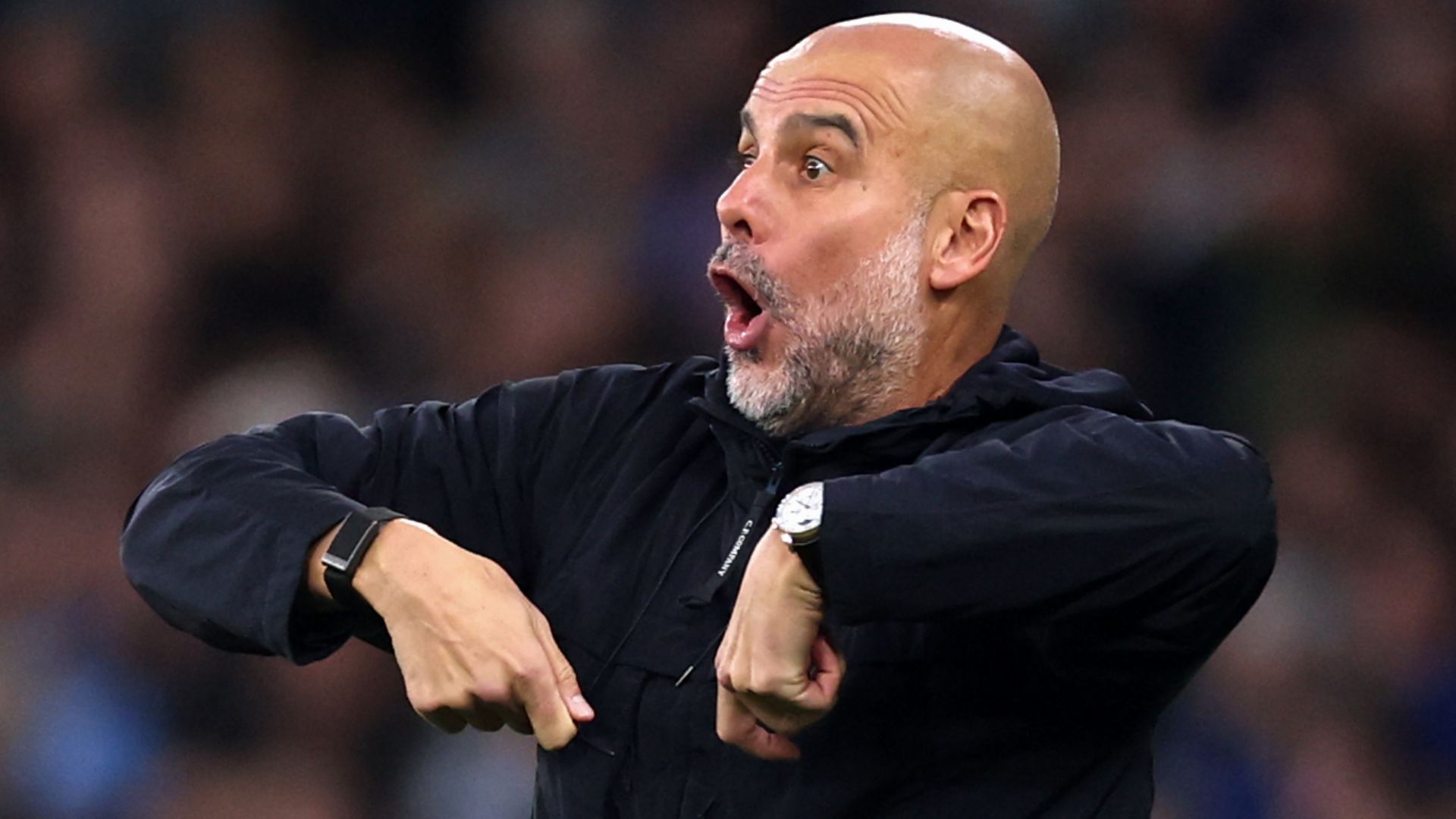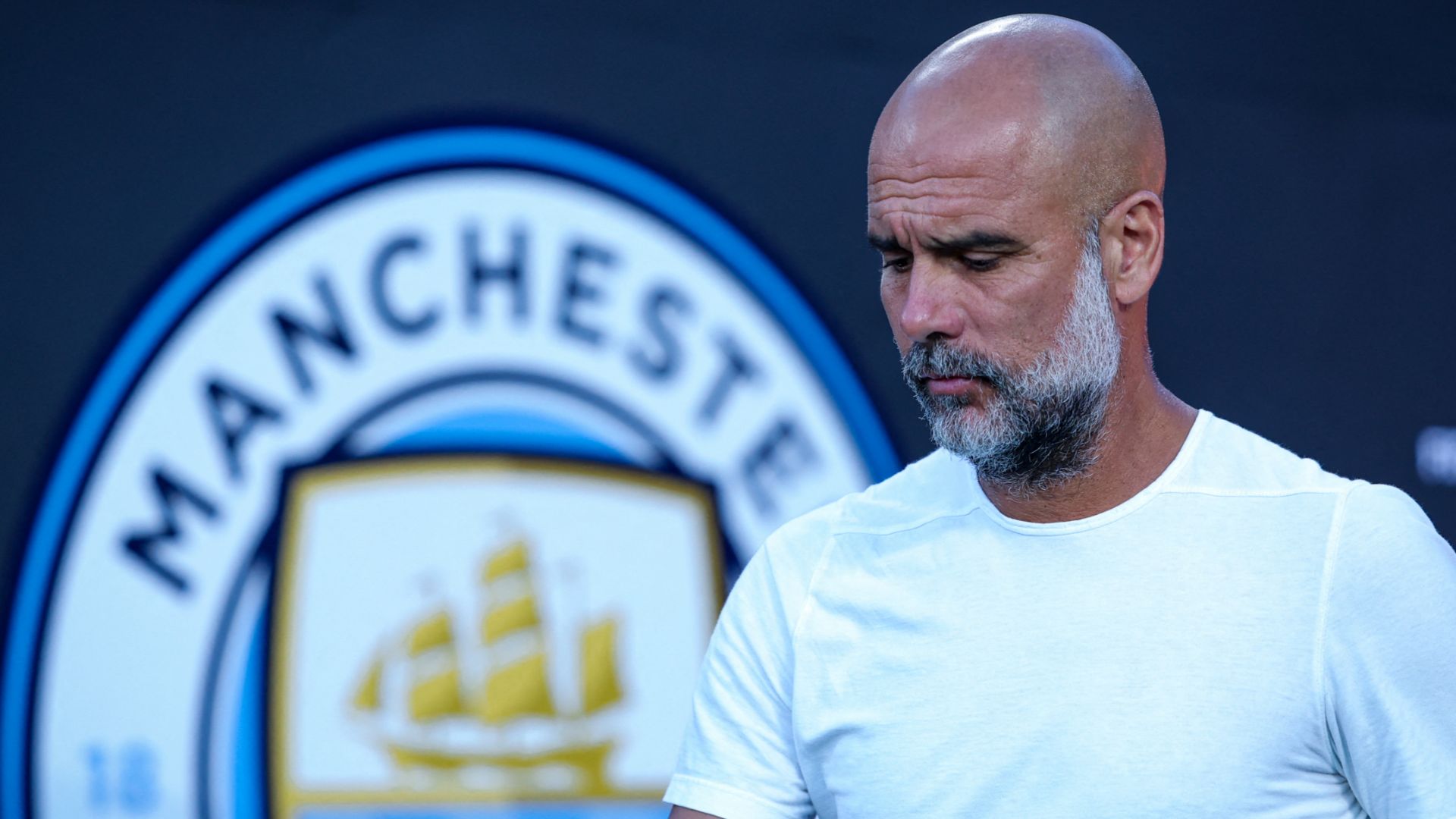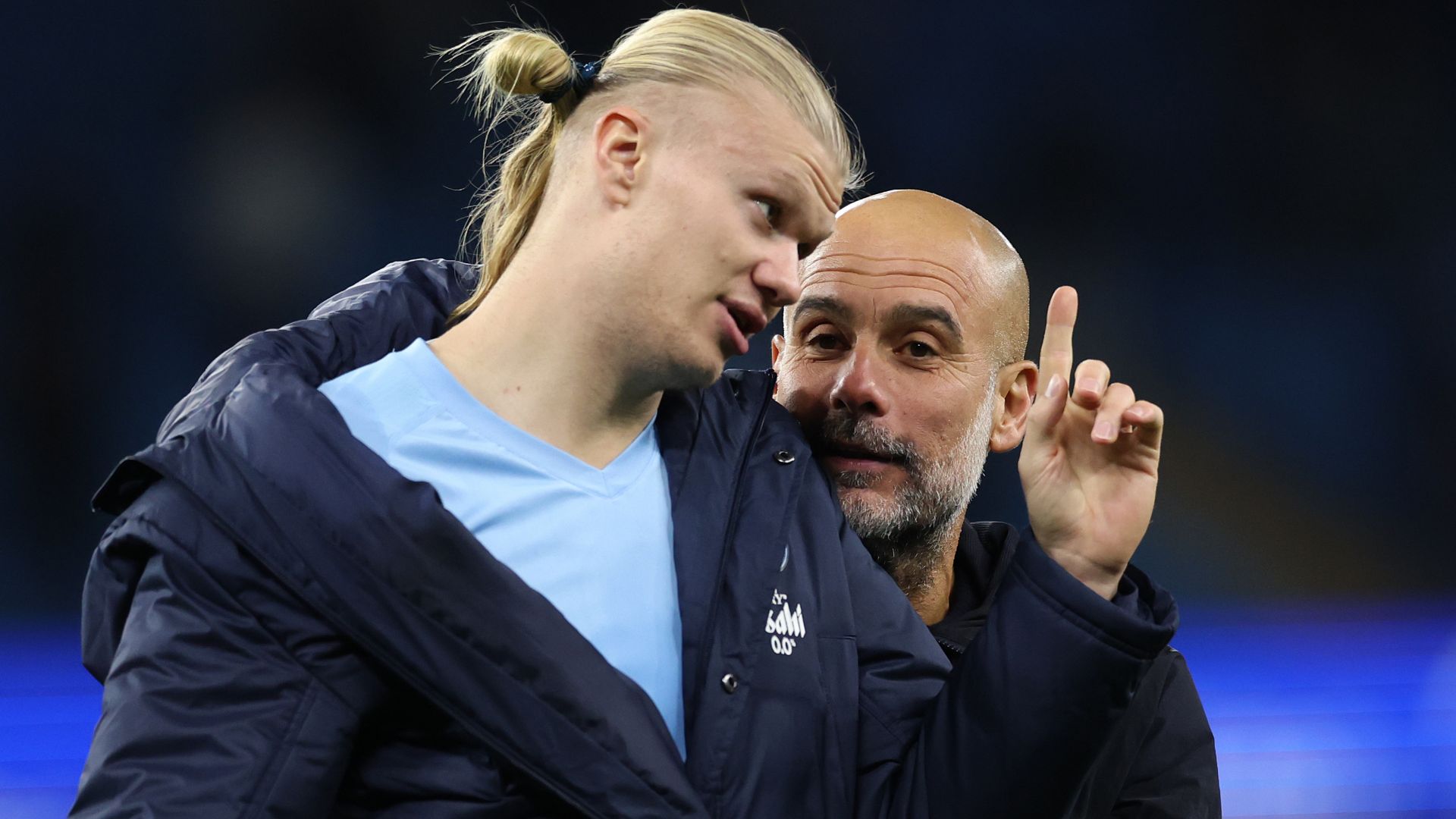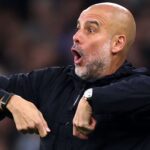


Pep Guardiola’s Ongoing Battle with Premier League Referees
In a fresh display of Pep Guardiola‘s frustration with match officials, the Manchester City boss has once again highlighted his decade-long concerns over refereeing decisions, emphasizing his reluctance to engage directly while pointing to persistent issues at the Etihad Stadium. This incident stems from a recent Premier League clash where controversial calls played a key role, underscoring the tensions between clubs and officials in high-stakes football.
The Controversial Moment in Manchester City’s Match
Early in the game, Manchester City took the lead thanks to a precise strike from the talented Norwegian forward Erling Haaland, putting the home team ahead during the first half. However, the visitors quickly leveled the score when the American international Tyler Adams found the back of the net, even though the City players believed their goalkeeper, Gianluigi Donnarumma, was unfairly blocked.
Dispute Over the Equalizer
The Italian shot-stopper claimed that David Brooks interfered with his movement by grabbing his arm during a corner kick, which stopped him from clearing the ball effectively. As a result, Donnarumma couldn’t reach the incoming cross properly, allowing Adams an easy finish from close range. Despite the protests from the City squad, the officials dismissed their appeals, and Donnarumma received a yellow card for his objections.
Guardiola’s Response and Refusal to Escalate
On the sidelines, Guardiola grew visibly agitated, rallying the fans to boost the team’s energy amid the controversy. Later, in his post-match comments, the Spanish coach addressed the situation without holding back, yet he explained his stance on avoiding formal complaints to referee authorities.
Insights into Guardiola’s Decade of Experiences
Reflecting on his time at Manchester City, Guardiola shared with journalists: “I don’t reach out to the referees or officials-it’s not my style to do so. They won’t contact me either, but in that instance, Brooks clearly disrupted Donnarumma’s balance by pulling his arm. I’ve pointed this out before; after ten years, I’m fully aware of the referees and the dynamics at this venue.” He continued, noting his packed schedule: “I’m focused on upcoming matches and don’t have the luxury to dwell on these discussions. I’ll simply ask the referee next time we meet if that was indeed a foul-I’m still waiting for clarity.”
Guardiola added a note of sarcasm, saying, “The officials here show real courage, especially at the Etihad. We’ve built a strong rapport over the years, and despite the challenges, I’m proud of what we’ve accomplished with the club-it’s been incredibly rewarding.”
Guardiola’s History of Avoiding Referee Debates
This isn’t the first occasion where the manager has voiced dissatisfaction with Premier League officiating since joining Manchester City in 2016. In past statements, he’s maintained a policy of distance, explaining: “I head to matches without knowing the referee in advance; it’s only when I see them that I recognize the face. Throughout my career, I’ve avoided commenting on referees before, during, or after games.”
Balancing Focus and Acceptance
He elaborated: “Errors happen, and they can leave us disappointed, but when they benefit us, we get a break. I prioritize my time wisely and concentrate on team performance rather than dwelling on calls. My main goal is ensuring we play at our best; rulings are what they are, and over a season, they even out-some aid us, others don’t.”
The Match Outcome and What’s Next for Manchester City
Ultimately, Tyler Adams’ strike didn’t change the final result, as Bournemouth left the Etihad without points. Haaland added another goal in the 33rd minute, bringing his seasonal tally to 17 at the club level, and Nico O’Reilly sealed a 3-1 victory for City around the 60th minute.
Upcoming Challenges for the Team
Looking ahead, Manchester City is set to face Borussia Dortmund in the Champions League on Wednesday, hosting the German powerhouse for what promises to be an intense encounter. Following that, they’ll host Liverpool on November 9 in a pivotal league match that could shape the standings before the international break.
The History of Pep Guardiola’s Criticisms of Referees
When it comes to the world of football management, few figures are as outspoken as Pep Guardiola. Over the years, Guardiola has frequently voiced his frustrations with referees, pointing to a pattern of questionable decisions that he believes have impacted his teams. This ongoing saga highlights the tensions between managers and officials, and it’s something that resonates with fans who follow Premier League drama closely.
Key Incidents Spanning a Decade
Guardiola’s beef with referees isn’t a recent development; it’s built up over more than ten years across his stints at Barcelona, Bayern Munich, and now Manchester City. Let’s break down some of the most notable moments where he’s called out officials for what he sees as errors.
- Early Years at Barcelona (2010-2012): Right from the start of his managerial career, Guardiola was no stranger to referee critiques. For instance, during high-stakes Champions League matches, he often highlighted decisions that favored opponents, arguing they swayed game outcomes. One memorable clash involved penalty calls that Guardiola deemed inconsistent, which he discussed in post-match press conferences. These early experiences shaped his approach to refereeing, emphasizing how Premier League-style scrutiny could benefit the game.
- Bayern Munich Era (2013-2016): As Guardiola moved to Germany, his criticisms evolved to include VAR precursors like goal-line technology. He famously pointed out several Bundesliga games where offside calls were mishandled, leading to what he called “unfair advantages.” Bullet points of specific grievances include:
- Referees missing clear fouls on key players, potentially costing points in tight title races.
- Inconsistent application of yellow cards, which Guardiola argued disrupted his team’s rhythm.
- A particular match against Real Madrid in the Champions League, where he publicly questioned the neutrality of officials, sparking widespread debate in football circles.
- Manchester City Challenges (2016-Present): Since joining Manchester City, Guardiola’s complaints have intensified, especially with the introduction of VAR in the Premier League. He’s repeatedly pointed to decisions that he feels have been biased or poorly judged, such as offside rulings and handball calls. For example, in recent seasons, he’s highlighted how these errors have led to dropped points in crucial fixtures. Some standout points include:
- During the 2021-2022 season, Guardiola’s post-match rants about VAR decisions in games against Liverpool and Chelsea gained traction online, with fans searching for “Pep Guardiola referee controversies” to relive the moments.
- In 2023, he faced fines from the FA for his comments, yet he stood firm, stating that accountability in refereeing is essential for fair Premier League competition.
Why Questionable Referee Decisions Impact Football
It’s not just about one manager’s gripes-Guardiola’s ongoing concerns shed light on broader issues in modern football. Refereeing decisions can dramatically alter match results, affecting team strategies, player morale, and even league standings. For anyone interested in “football management and referees,” this is a prime example of how high-profile critiques push for better standards.
In discussions around “questionable decisions in Premier League,” experts often note that factors like human error, VAR limitations, and pressure from fans contribute to inconsistencies. Guardiola has argued that these elements create an uneven playing field, which is why he’s advocated for reforms. Here’s a quick breakdown:
- The Role of VAR: While VAR aims to correct mistakes, Guardiola has pointed out its flaws, such as delays that kill the game’s flow and subjective interpretations that lead to debates.
- Impact on Team Performance: From a tactical standpoint, if referees frequently miss calls, it can force managers like Guardiola to adjust their styles, perhaps playing more defensively to avoid risks.
- Fan and Media Reactions: These incidents often go viral, with searches for “Pep Guardiola criticizes referees” spiking after big games, showing how they engage the community and spark conversations about fairness.
Guardiola’s Declaration: No More Engagement
Guardiola’s latest stance marks a turning point in his decade-long battle. He’s declared that he won’t seek further engagement with refereeing bodies, signaling frustration with the lack of change. This decision underscores the challenges managers face when pushing for “better referee accountability in football.” For instance, despite his calls for more transparency, such as releasing VAR audio for public review, progress has been slow, leading him to step back.
In exploring “Pep Guardiola’s legacy with officials,” it’s clear this affects not just his career but the sport as a whole. Managers everywhere are watching, as this could influence how future “questionable decisions” are handled in the Premier League and beyond.
Strategies for Fairer Refereeing in Football
To address these ongoing issues, let’s look at practical steps that could improve refereeing standards, drawing from Guardiola’s experiences and expert opinions:
- Enhanced Training Programs: Referees could benefit from advanced simulations that mimic high-pressure Premier League scenarios, reducing errors in real-time decisions.
- Key benefits: This might include using AI tools to analyze past “questionable decisions,” helping officials learn from mistakes.
- Increased Transparency Measures: Implementing policies like routine VAR explanations could build trust, as Guardiola has suggested.
- Potential outcomes: Fans and managers might feel more involved, with features like post-match reviews becoming standard.
- Manager-Referee Dialogues: Structured forums could allow for constructive feedback, turning Guardiola’s criticisms into positive changes.
- Why it matters: This fosters a collaborative environment, potentially lowering instances of “referee controversies in football management.”
Through these lenses, Guardiola’s story serves as a catalyst for discussion, encouraging a deeper dive into how refereeing evolves to meet the demands of modern football. With keywords like “Pep Guardiola referee critiques” naturally woven in, this article aims to rank highly for those seeking insights into his impactful journey.









